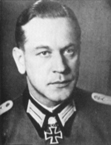hazxan
Posts: 69
Joined: 11/10/2007
Status: offline

|
quote:
ORIGINAL: Jonathan Palfrey
When playing computer games I often feel homesick for one particular feature of board games: we knew exactly how combat resolution was done, because we had to do it ourselves. In a computer game, when you send your men into battle, something happens; but you generally don't know why or how, because the program resolves things mysteriously and the programmer isn't telling.
In a computer game, if you attack with superior numbers and get wiped out, you don't know what's going on. Is there a bug in the program? Is it biased against me? Is there some hidden factor that I don't know about? Is it fatal to attack on Saturday mornings when the wind is in the south?
I totally agree! I don't even think it's realistic to force is to make decisions without any clue as to the outcome. I'm sure when commanders are poring over the maps, they'd at least have some idea that "we can attack here but I reckon we'd have 25% casualties". A real life commander has staff to assist his decision making, in a game the computer should take the place of these assistants (as well as being your opponent).
One feature I really like about Panzer General is that you can get a rough idea of the outcome, without actually attacking. Civ 4 has the same feature and even breaks it down into the factors that affect the outcome. So it's easy to see that, say, attacking from a hill with a small unit may be a better option than attacking across a river with a large unit.
By now I'm going way OT, but I find the whole area of game design fascinating. Recently I read that humans can hold at most 10 - 20 pieces of info in the heads at one time. Any more than that and it gets forgotten and you have to go back and relearn it every time. This is exactly how I feel with the larger games. With, say, 100 independant units, I have to relearn the whole board each turn. Contrast with the Total War designers, who have handled it really smart. Despite the fact you may have 5,000 individual soldiers in 15 units, they have provided clear grouping functions, so in reality you're aware of just 4 or 5 entities: My general here, that block of 6 spear units there, a line of archers here, a group of flanking cavalry here and thats it.
Another important thing with computer games is 'flow'. There's a feedback loop from the game presenting you with information, you analysing and planning you're strategy, executing that strategy, then going back to the start of the loop and seeing the results of you're moves and so on.... The tighter this loop, the better. In Civ 4 or Panzer General it's very tight. "Wooah he's attacking over there. I'll move these units to get him. Arrghh he's beaten them I'll move this lot over" etc etc etc till before you know it the sun is rising!
Contrast with those games that should remain nameless, where to start with, executing your strategy takes 20 minutes of clicks and searches over the map and scrolling up and ledgers of each company just in case you miss something. Then finally you click next turn....and wait 5 minutes for the AI. Now you have to roam all over the (inevitably huge) map to find the results of actions you took maybe 30 minutes earlier!!!!!! That is an example of seriously broken 'flow'.
Veldor mentions the 2,000 hours put into getting the details correct at the expense of the UI- it's not just the interface that loses out, some of that time would be better spent on AI development, too. But apparently no *serious* gamer plays against the AI, they all play online and have PBEM games that take a year to complete Though, this is the kind of high level of time commitment that I think Jonathon (and thousands of others) are trying to avoid. Though, this is the kind of high level of time commitment that I think Jonathon (and thousands of others) are trying to avoid.
I suspect there's a lot of 'smoke and mirrors' going on under the hood with a lot of modern strategy games. Information is being hidden and we're being subjected to lots of overwhelming micromanagement mainly to benefit the AI. Don't forget, the AI knows EVERY stat and the location of EVERY unit at all times!!! It also knows the exact combat resolution rules and has absolutely no problem with micromanagement.
|
 Printable Version
Printable Version










 . And to have ever more 'phases' to bog the processor down (ignoring gameplay)
. And to have ever more 'phases' to bog the processor down (ignoring gameplay) 
 Though, this is the kind of high level of time commitment that I think Jonathon (and thousands of others) are trying to avoid.
Though, this is the kind of high level of time commitment that I think Jonathon (and thousands of others) are trying to avoid. 


 New Messages
New Messages No New Messages
No New Messages Hot Topic w/ New Messages
Hot Topic w/ New Messages Hot Topic w/o New Messages
Hot Topic w/o New Messages Locked w/ New Messages
Locked w/ New Messages Locked w/o New Messages
Locked w/o New Messages Post New Thread
Post New Thread